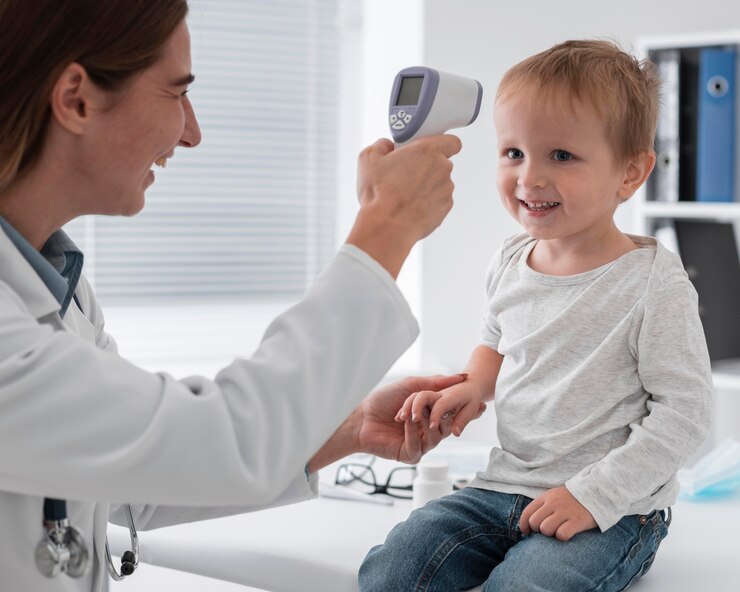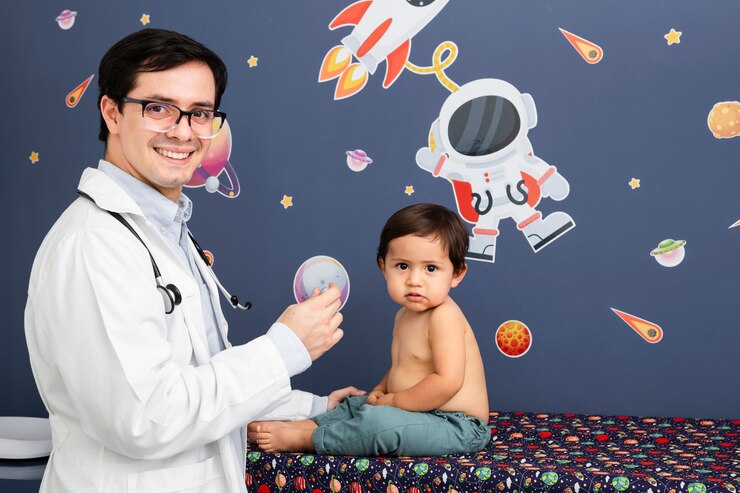
Diagnosis and care for children, which paediatricians usually do, incorporates almost all medical services given to patients within the range of 0-18 years. This area concentrates on kids’ physical, emotional and developmental health, as well as maintaining their well-being through correct diagnosis, treatment therapies, and preventive care. Pediatric diagnosis and care include evaluation, diagnosis, treatment, and handling of different diseases among children. These duties are done by paediatricians, who are doctors specifically trained to take care of children’s healthcare needs. They aim to monitor growth and development, prevent illnesses, and manage acute or chronic health problems in young individuals.
KEY COMPONENTS OF PEDIATRIC DIAGNOSIS & CARE
- Regular check-ups to ensure that a child properly develops.
- Immunizations that protect against some infectious diseases.
- Screening tests to identify possible health issues early enough.
- Keeping track of milestones achieved during physical, emotional or social development.
- Recognition of developmental delays or disorders has also been addressed here.
- Resources or guidance can be given about concerns over the development process.
- Identification plus management of frequent childhood sicknesses like common colds, flu, ear infections, and gastrointestinal upsets, among others.
- Management of severe cases, such as pneumonia, asthma attacks, injuries due to accidents, etc., in kids occurs here, too.
- Continual attention is offered for long-term disorders, such as epilepsy, diabetes, asthma, congenital heart disease, etc.
- Instead, we provide comprehensive, complex healthcare management with other experts who deal with the same issue.
- This entails handling behaviour which is inclusive of ADHD, anxiety, depression or ASD.
- This heading covers the provision of counselling therapy and other referrals to mental health professionals.
- A healthy diet was also promoted alongside regular engagement in physical activity as part of a child’s life.
- There are weight problems and malnutrition-related problems that should be handled.
- This teaches families about the prevention of injuries, cleanliness, nutrition habits, etc.
- Expectations for children’s growth and development during various stages are shared here.
DIAGNOSTIC TOOLS & TECHNIQUES

- Physical Examinations: Full physical assessments are carried out to confirm whether any illnesses or developmental issues are present.
- Laboratory Tests: These include blood examinations, urine tests, and other laboratory work aimed at diagnosing infections and allergies, among other things.
- Imaging Studies: X-rays, ultrasound, MRIs, CT scans, which help diagnose internal conditions or injuries.
- Developmental Screenings: Tools such as Ages & Stages Questionnaires (ASQ) help monitor a child’s development.
- Behavioural Assessments: Different scholars have designed questionnaires to evaluate behavioural disorders in children; sometimes, they also use the interview method.
IMPORTANCE OF PEDIATRIC CARE
Detection & Intervention
Timely identification of health problems can result in higher treatment efficacy and outcomes.
Support for Families
Resources are included to help family members maintain a child's healthy state and support his development
Preventive Health
Immunization, as well as instruction on good lifestyle choices, decrease the likelihood of future health issues.
WHY TO CHOOSE US ?
- Expert Pediatricians: These are medical experts working for our hospital who have been trained extensively, and we rely on them to keep children well.
- State-of-the-Art Facilities: We use modern diagnostic tools and technologies to ensure precision and effectiveness in care.
- Holistic Approach: We take a rounded approach to child care by catering to each child’s physical, emotional, and growth requirements.
- Family-Centered Care: Our hospital offers support, education, and resources to enhance a child’s optimal health.

